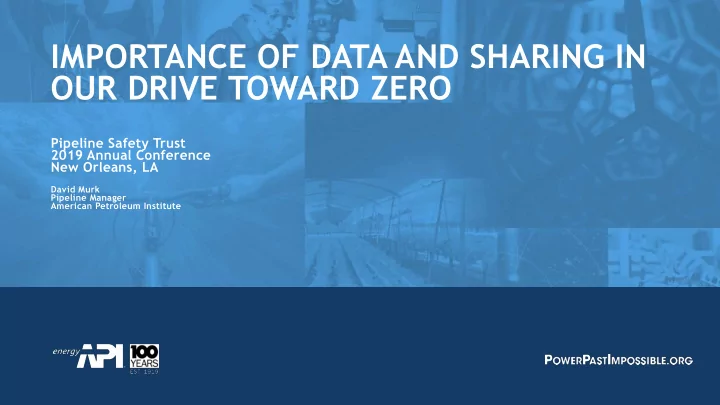

IMPORTANCE OF DATA AND SHARING IN OUR DRIVE TOWARD ZERO Pipeline Safety Trust 2019 Annual Conference New Orleans, LA David Murk Pipeline Manager American Petroleum Institute
Industry Awakening • Bellingham was the impetus for sweeping changes within the industry • New mandates strengthened PHMSA Office of Pipeline Safety initiatives and the Agency created several new regulatory programs for pipelines • The pipeline industry advanced pipeline safety and reliability through the development and adoption of API leading practices and standards that exceed current regulatory requirements • But more importantly changes in the aftermath of Bellingham put a spotlight on the importance of data to support how operators managed the integrity and operations of their pipelines and engaged with key stakeholders and the public
Transformation of Data & Information • Pre-Bellingham Data Landscape − PHMSA incident data limited − No mapping data reporting requirements (Voluntary only) − No specific damage prevention data reporting requirements − OMB more reluctant to require collection of data − Common ground study completed but no one-call requirement • Post Bellingham Data Landscape − Mandatory reporting requirements for National Pipeline Mapping System − Greater Emphasis on One-call Programs and tracking of 3 rd party damage − Industry builds own data tracking system to fill data gaps − Significant focus on data for integrity management programs
Dedicated Data Tracking System • API/AOPL’s Pipeline Strategic Data Tracking System (Formerly PPTS), created to support data needs at time when PHMSA data collection not as robust • Analysis of PHMSA and PSDTS hazardous liquid accident and annual/ infrastructure data allows for operator benchmarking across the industry • Focus has expanded from accident and annual/infrastructure data to include other leading and lagging indicators such as PHMSA’s enforcement data, safety related conditions and IM notifications.
Dedicated Data Management Team • Created a Data Management Team (DMT) in 2000 to address data needs for liquid pipeline operators • Consists of pipeline operators charged with the management of data within their organizations and oversight of the API/AOPL’s Pipeline Strategic Data Tracking System • The DMT provides critical analysis and key insights into the data to support liquid pipeline leadership decision making and execution of strategic priorities for liquid pipeline operators (3-Year Strategic Plan)
Benefits of PSDTS & PHMSA Data • Operator Performance Comparison Reports • Supporting Data for API/AOPL Strategic Initiatives • Advisories • Electrical Related Release Advisory • Releases to Facility Piping and Equipment • Corrosion release advisory
The Evolution of Data for Integrity Management Baseline in establishing integrity management programs under a new regulatory regime Ongoing advances in inspection technology driving better data, but also emphasizing the importance of analysis Technology advancements and data accuracy provides operators with the ability to more effectively assess and manage risks along the pipeline Data collection through research and development and operator inspections and sharing next phase in maximizing data
Data Core to SMS & Continuous Improvement
Data Core to SMS & Continuous Improvement Zero Incidents
Data Core to SMS & Continuous Improvement ROW 3-Year 3-Year PHMSA IPE/ OSHA Injury Incidents / Kmile Annual Rate Averages Averages � Kmile Key metrics used in comparison to industry averages provide the effectiveness score as an addition Key metrics used in comparison to industry averages provide the effectiveness score as an addition conformance. � conformance. Maturity Maturity Conformance Conformance � Effectiveness � Effectiveness Score Score �
Benefits Beyond Safety Process S Safety y IMPROVED DECISION-MAKING Kno nowle ledge T Trans nsfer PERFORMANCE IM IMPROVEMENT IMPROVED EMPLOYEE MORALE Meet/Exceed S Stakeho hold lder E Expectations ns EFFIC ICIE IENCY A AND E D EFFECTIV IVENESS B BALANCE COMPLIANCE ASSURANCE
Creating a Sharing & Learning Culture Tools • Guide to Sharing • Guide to Learning • Recommended Practice 1173 (RP 1173) • Ad hoc peer-to-peer sharing brochure Sharing Platforms • Pipeline Information eXchange (PIX) • Pipeline Industry Practical Experience Sharing (PIPES) • Industry-wide KPIs to measure • Quarterly Virtual Tailgates (VT) progress and improvement • Pipeline Conference • Safety share at all meetings (PSE SC, Pipeline Subcommittee, Midstream Committee, etc.) • Evaluation of growth and • Roundtable safety sharing at workgroup development of Pipeline SMS meetings (PET, COG, PLIG, etc.) • Aggregation of data to
What Does The Future Look Like? API PIX/COS INGAA Lessons Common Ground APGA Virtual TG Learned Alliance AGA Peer SGA Roundtables Assessments VIS Data Hub PRCI TDC PHMSA R&D PHMSA GIS, PRCI ILI R&D Incident & PL Data PHMSA Standards Making • Industry-wide KPIs to measure Investigations & Organizations Enforcement progress and improvement GTI IM Assessment Validation Projects NTSB Investigations • Evaluation of growth and Labor/Workforce/ Contractors Assessment Providers API 1163 Process development of Pipeline SMS PHMSA & State Congress, States & Pipeline Operators NGO ’ s PST, EDF Partners Local Officials • Aggregation of data to
Recommend
More recommend